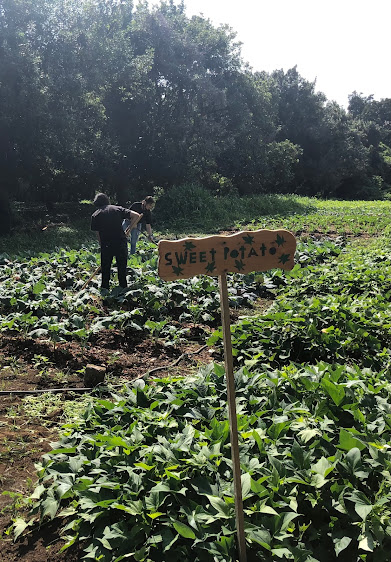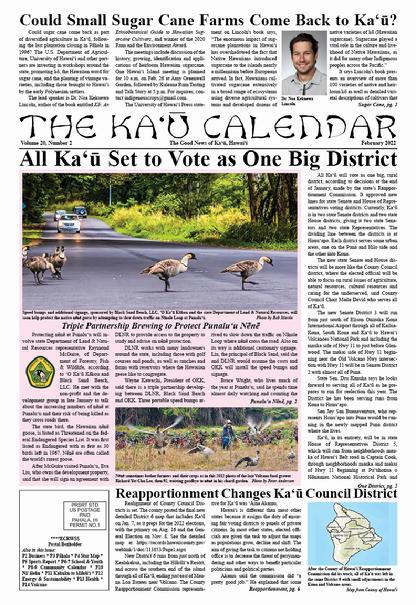 |
| Blue Hawaiian taro, more ornamental, but its corm can be eaten. Photo from Gardenia, Creating Gardens. See www.gardenia.net/plant/colocasia-esculenta-blue-hawaii-taro |
To perpetuate taro growing, the Hawai'i Legislature is entertaining bills to support the preservation of taro lands. Citizens can read more on each bill and testify by clicking on the links:
 |
Taro, also called kalo, this in a dryland planting. Photo from Bishop Museum |
SB2665: RELATING TO THE PROTECTION OF TARO - Prohibits the Board of Land and Natural Resources, in declaring residential development areas and acquiring lands therein, from disturbing certain wetland taro lands and infrastructure on undeveloped lands within the conservation district established
 |
| Taro growing on the Kaʻū High School campus, students working on mulch in the background. Photo by Julia Neal |
How upland, dryland taro was grown and eaten is explained by a Bishop Museum Publication, Hawaiian kalo:
"Relying on rainfall for irrigation, dryland cultivation favors very moist environments, but can also occur in drier areas with constant mulching. Forest land was frequently cleared for dryland cultivation. One technique practiced in dryland farming was to use fern fronds as mulch during times of high light exposure and to remove the fronds during times of adequate rainfall. Banana stumps, fermented breadfruit and burnt coconut fiber ash were also used as mulching material.
"Dryland taro was usually grown by placing the huli into a mound of soil, which gave the corm adequate room for expansion. An ‘ō‘ō (digging stick)was used to prepare the hole for the huli. Mulch was placed around the base of the planting and natural rainfall provided watering. Dryland taro takes longer to mature than wetland varieties, about 8-12 months. Some dryland varieties could remain in the soil for three to twelve months beyond maturity. Most Lauloa varieties could stay in the ground indefinitely. Dryland taro was usually eaten in chunks after being baked or steamed." Wetland taro is also explained. See
http://hbs.bishopmuseum.org/botany/taro/key/HawaiianKalo/Media/Html/characters/cultivation.html
SB2675: RELATING TO SUSTAINABLE AGRICULTURE - Establishes a three-year cover crop reimbursement pilot program to provide reimbursement to farming operations in the State for costs related to cover cropping. Establishes a cover crop reimbursement pilot program manager position within the department of agriculture to administer the program. Requires an annual report to the legislature. Appropriates funds.
SB2990: RELATING TO SUSTAINABLE AGRICULTURE - Establishes a cover crop reimbursement pilot program to provide up to seventy-five per cent cost reimbursement to farming operations in the State for acquiring cover crop seeds, green manure, or compost. Requires the convening of a review panel to screen and rate applicants on the quality of their cover crop and green manure and composting practices. Establishes a cover crop reimbursement pilot program manager position within the Department of Agriculture to administer the program. Requires a report to the Legislature. Appropriates funds.
 |
| Students growing sweet potatoes on the farm at Kaʻū High & Pahala Elementary. Photo by Julia Neal |
SB2955: RELATING TO COMPOSTING - Requires the Department of Agriculture to establish a three-year compost reimbursement pilot program to provide reimbursements to farmers and ranchers when purchasing compost from a certified processor, dealer, retailer, or wholesaler licensed to do business in the State. Establishes a temporary compost reimbursement pilot program manager position. Requires the Department to submit a report to the Legislature. Appropriates funds.
SB3004: RELATING TO COMPOSTING - Establishes and appropriates funds for a compost reimbursement program within the department of agriculture and one full-time permanent compost reimbursement program manager position to oversee the program. Requires an annual progress report of the program to the legislature prior to each regular session.
SB3197: RELATING TO AGRICULTURE - Establishes a Beginning Farmer Training Program. Makes an appropriation to the University of Hawaii for the Beginning Farmer Training program.
HB2304 HD1: RELATING TO THE FARM SCHOOL PROGRAM - Appropriates funds to the DOE to secure additional resources to help implement the Hawaii farm to school program, specifically to implement internal systems and controls to meet the State's local food goals in school meals. Requires the DOE to submit a report to the legislature no later than 1/1/2023 that details a plan and timeline for implementing the Hawaii farm to school program.
HB1517: RELATING TO COFFEE - Requires coffee blend labels to disclose geographic and regional origins and percent by weight of the blended coffees. Prohibits using geographic origins of coffee in labeling or advertising for roasted or instant coffee that contains less than a certain percentage of coffee by weight from that geographic origin, phased in to a minimum of fifty-one percent after 7/1/2024. Prohibits use of the term "All Hawaiian" in labeling or advertising for roasted or instant coffee not produced entirely from green coffee beans grown in Hawaii. Appropriates moneys for the pesticide subsidy program and for one full-time equivalent position to conduct inspections.
 |
| A new Tri-Park pass features a lehua blossom and is good for a year. NPS photo |
A NEW TRI-PARK ANNUAL PASS IS AVAILABLE FROM HAWAI'I VOLCANOES NATIONAL PARK. It features an image of a lehua blossom and can be picked up at Hawaiʻi Volcanoes National Park. The Hawai'i Tri-Park Pass is valid for 12 months from the date of purchase for use at Hawai'i Volcanoes National
Park, Haleakalā National Park, and Pu‘uhonua o Hōnaunau National Historical Park. For info on fees, visit the park website: https://go.nps.gov/HAVO-fees.
To read comments, add your own, and like this story, see www.facebook.com/kaucalendar/. See latest print edition at www.kaucalendar.com. See upcoming events and Kaʻū Calendar newspaper sponsors at http://kaunewsbriefs.blogspot.com/2022/02/events-of-february-2022.html.
BOWLING AT KILAUEA MILITARY CAMP is open to the public. KMC recently posted the reminder on its facebook. "If you're having a #ManicMonday make a reservation to come and bowl with us! Our lanes are open to the public and available for private buyout. Just call to make a reservation at (808)-967-8350." |
| See the February Print Edition of The Kaʻū Calendar at www.kaucalendar.com |
